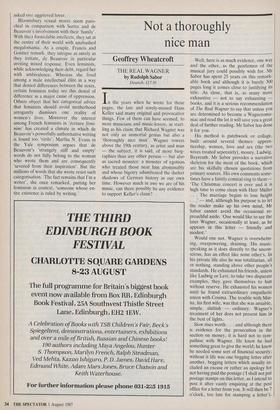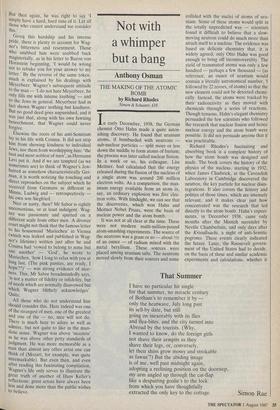Not a thoroughly nice man
Geoffrey Wheatcroft
THE REAL WAGNER by Rudolph Sabor Deutsch, £17.95 In the years when he wrote for these pages, the late and sorely-missed Hans Keller said many original and provocative things. Few of them can have seemed, to most musicians and music-lovers, as start- ling as his claim that Richard Wagner was not only an immortal genius but also a 'thoroughly nice man'. Wagner towers above the 19th century, as artist and man — the subject, it is said, of more biog- raphies than any other person — but also as sacred monster: a monster of egotism who treated those near him abominably and whose bigotry adumbrated the darker shadows of German history in our own time. However much in awe we are of his music, can there possibly be any evidence to support Keller's claim? Well, here is as much evidence, one way and the other, as the gentlemen of the musical jury could possibly wish for. Mr Sabor has spent 25 years on this remark- able book and although it is barely 300 pages long it comes close to justifying its title. As close, that is, as many more exhaustive — not to say exhausting books, and it is a serious recommendation of The Real Wagner to say that unless you are determined to become a Wagneroma- niac and read the lot it will save you a great deal of further reading. Mr Sabor has done it for you.
His method is patchwork or collage, built around several themes: appren- ticeship, women, love and sex (the two wives treated seperately), money, Ludwig, Bayreuth. Mr Sabor provides a narrative skeleton for the meat of the book, which are his skilfully chosen quotations from primary sources. His own comments some- times have a faintly comical ring to them 'The Christmas concert is over and it is high time to come clean with Herr Muller . . . The marriage begins to lose height . . — and, although his purpose is to let the reader make up his own mind, Mr Sabor cannot avoid the occasional re- proachful aside: 'One would like to see the later Wagner, occasionally at least, as he appears in this letter — friendly and modest.'
Would one not. Wagner is overwhelm- ing, overpowering, draining. His music, speaking as it does directly to the uncon- scious, has an effect like none other's. In his private life also he was totalitarian, all or nothing, standing above other people's standards. He exhausted his friends, unless like Ludwig or Levi, to take two disparate examples, they gave themselves to hint without reserve. He exhausted his women until he found extraordinary empathetic union with Cosima. The trouble with Min- na, his first wife, was that she was amiable, simple, sluttish — ordinary. Wagner's treatment of her does not present him in the best of lights.
Slow rises worth . . . and although there is evidence for the prosecution in the section on money, it is hard not to sym- pathise with Wagner. He knew he had something great to give the world; he knew he needed some sort of financial security; without it life was one begging letter after another, begging letters which usually in- cluded an excuse or rather an apology for not having paid the postage CI shall not put postage stamps on this letter, as I intend to post it after vainly enquiring at the post office for a letter from you. It will then be 7 o'clock, too late for stamping a letter').
But then again, he was right to say 'I simply have a hard, hard time of it. Let all those who cannot understand me consider this.'
Giveq this hardship and his intense pride, there is plenty to account for Wag- ner's bitterness and resentment. Those who snubbed him were snubbed back magisterially, as in his letter to Baron von Hornstein beginning, 'I would be wrong not to rebuke you for your answer to my letter.' By the reverse of the same token, much is explained by his dealings with Meyerbeer: Wagner's subsequent attitude to the man — 'I do not hate Meyerbeer, he only fills me with intense loathing' — and to the Jews in general. Meyerbeer had in fact shown Wagner nothing but kindness. But no good deed goes unpunished, and it was just that, along with his own fawning beseechment, that Wagner could never forgive.
Elsewise the roots of his anti-Semitism lay in his life with Cosima. It did not stop him from showing kindness to individual Jews, nor them from worshipping him: 'the best and most noblest of men', as Hermann Levi put it And if we are tempted (as we sometimes are) to think of Wagner's Jew- hatred as somehow characteristically Ger- man, it is worth noticing the touching and direct reproaches on the subject which he received from Germans as different as Minna, Ludwig and — retrospectively his own son Siegfried. Nice or nasty, then? Mr Sabor is rightly uncensorious, or at least indulgent. Wag- ner was passionate and spirited on a different scale from other men. A divorce court might not think that the famous letter to his housemaid `Mariechen' in Vienna (which was leaked and published in Wag- ner's lifetime) written just after he and Cosima had 'vowed to belong to none but One another' — 'God', he wrote to Mariechen, 'how I long to relax with you at long last. (The pink panties, are ready, I hope??)' — was strong evidence of nice- ness. This, Mr Sabor broadmindedly says, IS not a matter of fidelity or infidelity, but of needs which are normally disavowed but which Wagner blithely acknowledges'. Quite.
All those who do not understand him should consider this. Here indeed was one of the strangest of men, one of the greatest and one of the — no, nice will not do. There is much here to adore as well as admire, but not quite to like in the mun- dane sense. Wagner was above 'niceness' as he was above other petty standards of judgment. He was more memorable as a man than almost any other artist one can think of (Mozart, for example, was quite unremarkable). But even then, and even after reading this fascinating compilation, Wagner's life only serves to illustrate the great truth of another of Hans Keller's reflections: great artists have always been less and done more than the public wishes to believe.



















































 Previous page
Previous page